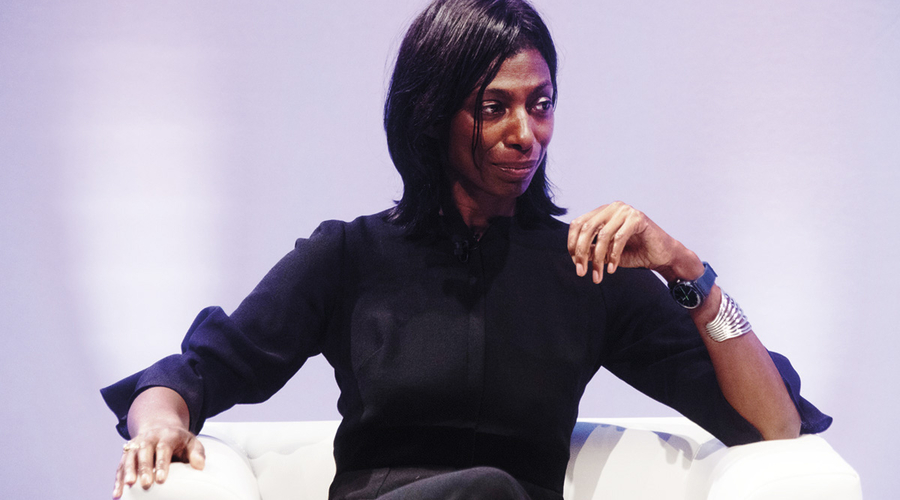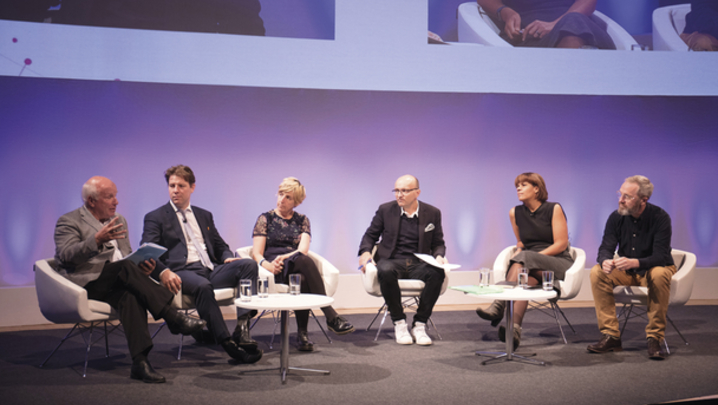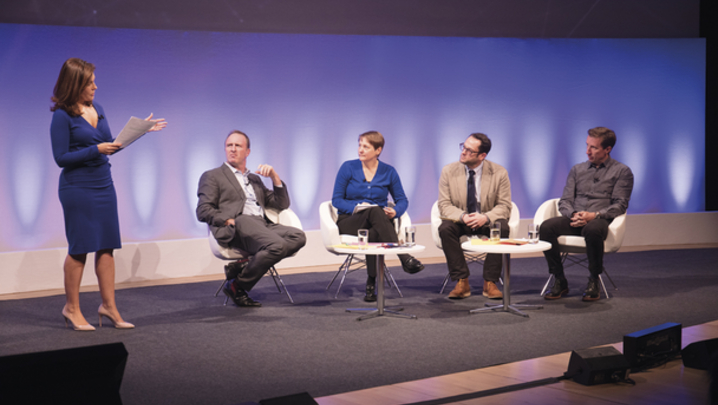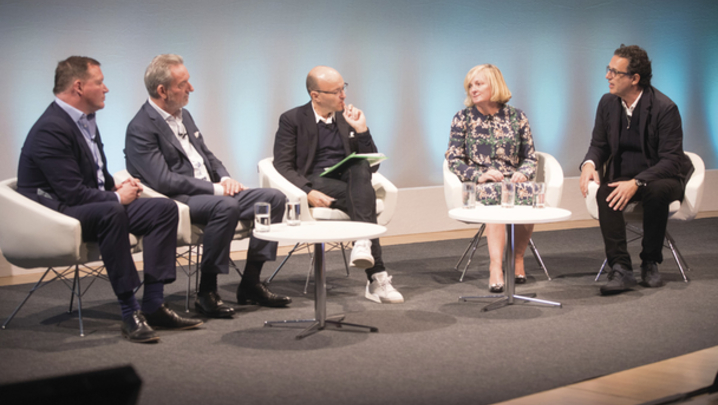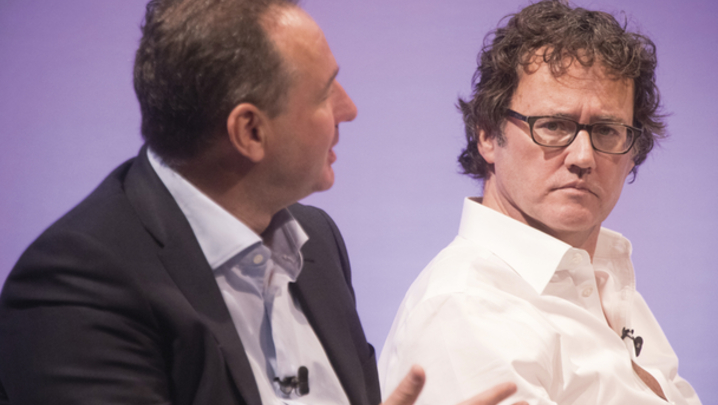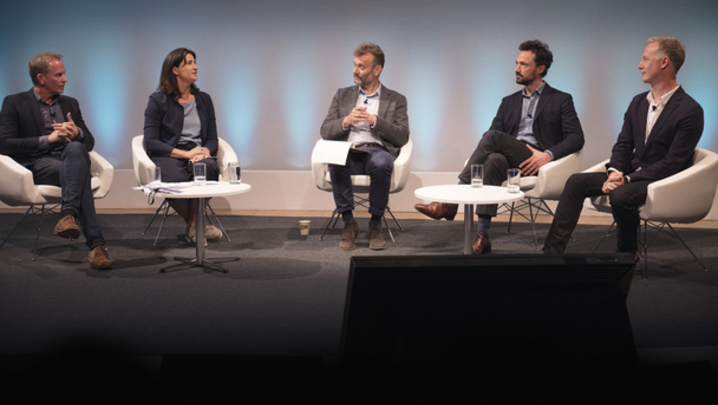Matthew Bell is attentive as Ofcom CEO Sharon White talks tough on diversity
During an authoritative performance at the RTS Convention, Ofcom chief Sharon White offered a frank appraisal of the day’s big issues. She called broadcasters’ performance on diversity “woeful” and strongly criticised the “paucity” of information that they had shared. The BBC, she added, “really ought to be leading the pack”, rather than running in the middle of it.
Turning to social class, White argued that unpaid internships could “reinforce and propagate inequality”.
She also defended Ofcom’s advice to the Government not to refer 21st Century Fox’s proposed takeover of Sky on the ground of broadcasting standards, but which the Secretary of State had rejected 48 hours earlier. This advice had been “careful [and] detailed”, and stood up to scrutiny, White insisted.
It has been a busy year for Ofcom. In April, it became the BBC’s first external regulator, taking over from the BBC Trust, and, in July, it published a draft operating framework, outlining how it planned to regulate the corporation.
“We are seeking views and, as an expert independent regulator, the decisions that we take are independent of both political influence but also commercial influence,” said White, a career civil servant who took up the reins at Ofcom in March 2015.
Under questioning from Newsnight presenter Kirsty Wark, White denied that the Secretary of State for Digital, Culture, Media and Sport, Karen Bradley, was trying to interfere in regulating the BBC.
Asked whether she felt “under pressure”, White replied: “No, not at all.”
Defending Ofcom’s new role as the BBC’s regulator, White said: “[With] the system we had previously, [there] was general, wide agreement that it was lacking, because there was this fuzziness between regulation and governance.
“Although the BBC is a new responsibility, we’ve been regulating the rest of the broadcasting industry for years. I believe we’ve got a wealth of experience and expertise.”
In July, the BBC published the controversial list of what some of its top talent earns. This revealed that two-thirds of its highest-paid presenters and journalists – those earning £150,000 or more a year – are male.
“I guess I’m surprised by the extent [of the gender gap]. It clearly isn’t right that men and women are paid different rates simply because of their gender,” said White.
She suggested that the figures were another illustration of “the importance and power of transparency”. White continued: “There’s an analogy between the gender pay data and what we’re trying to do on diversity – you can’t fix what you don’t understand. Some people fear transparency; personally, I think transparency creates trust.”
Turning the conversation to the UK’s withdrawal from the European Union, Wark asked: “What worries you most about the impact of Brexit?”
“As a regulator, we have no view on whether Brexit is a good or bad thing but, having taken the temperature of the industry in recent months,” replied White, “the issue that flashes red within my remit is the country of origin principle’. This creates a common area for broadcasters in the EU, and the UK is the most popular location for US companies to base their European subsidiaries.
“We are very lucky to have lots of broadcasters in the UK who don’t necessarily broadcast to a UK audience,” said White. “We’ve been discussing with the Government and making the case and I think it’s understood. And it’s obviously a subject of the [Brexit] negotiations.”
Big players such as Disney, Discovery, and NBC, suggested Wark, could up sticks to another European capital if their Ofcom licences were no longer recognised in EU countries. “Whatever you think of Brexit,” Wark said, that would be “detrimental” to the British economy.
“I agree,” replied White. “That’s why, of all the regulatory issues in my in-tray on Brexit, the country of origin principle is the single most critical one.”
Any loss of freedom of movement following Brexit, added White, would be “a big issue for the industry”, although not one that “comes directly into our purview. It’s a concern that we hear a lot in the discussions that we have on both the media and the telecommunications sides of our work.”
‘Session 6: Sharon White in conversation with Kirsty Wark’ featured Sharon White, CEO of Ofcom, who was interviewed by Newsnight presenter Kirsty Wark. The session was produced by Sue Robertson and Martin Stott.
White defends Ofcom’s work on Fox’s bid for Sky
The day before the RTS Convention began, culture secretary Karen Bradley announced that she intended to refer 21st Century Fox’s £11.7bn proposed takeover of Sky to the Competition and Markets Authority (CMA) on the grounds of both media plurality and genuine commitment to broadcasting standards.
The Murdoch media giant expressed ‘disappointment’ that Bradley had not decided to follow the advice of the regulator, Ofcom, on the issue of broadcasting standards. The regulator had advised: ‘We consider that there are no broadcasting standards concerned that may justify a reference.’
The minister, however, raised so-called ‘non-fanciful’ concerns about compliance procedures at Fox News and corporate governance at the Murdoch companies.
Bradley had been concerned about a number of sexual harassment allegations at Fox News and the channel’s editorial independence.
Ofcom boss Sharon White described her organisation’s work on the Sky takeover as ‘very, very careful [and] detailed’. However, she added: ‘The way the system works is that the Secretary of State has statutory discretion – she is the decision taker.…
‘There is transparency – it is absolutely clear at each stage. We did advise that there was enough evidence to justify referral on media plurality but not on the broadcasting standards consideration.
‘We took the utmost care – it has been a very, very detailed, very rigorous process.
‘Our works stands now for scrutiny. The Secretary of State has made a decision and it’s over to my good friends at the CMA to do further scrutiny.’
Question & answer
Q: Deborah Williams, CEO, Creative Diversity Network: Do you think there are synergies between the data we produce [the “Diamond” diversity monitoring system created by the BBC, Channel 4, ITV and Sky through the CDN] and what [Ofcom] has produced, and do you think we should be working closely together to get the industry more aligned?
A: Sharon White: Yes to all the above. We’re very strong supporters of Diamond… the more Diamond and we can work together so that there is an open and consistent picture of the make-up of our industry, the better.
Q: Wilfried Genest, analyst, DE Shaw: How much assistance is Ofcom going to provide to the Competition and Markets Authority (CMA) as it reviews broadcasting standards, which is not something the CMA traditionally usually does?
A: Sharon White: The CMA is going to have to decide its process.… [It] may call on us as an expert witness, almost, but how that process is going to run, we don’t know.
Q: Ed Shedd, head of UK TMT, Deloitte: Are Google and Facebook media companies?
A: Sharon White: I think they are.
Q: Ed Shedd: And do they need to be regulated?
A: Sharon White: I don’t think regulation is the answer, because I think it’s really hard to navigate the boundary between regulation and censorship of the internet. I do think that the companies need to take more responsibility as publishers as well as platforms, and I also think, to be frank, that content providers and advertisers, as we are beginning to see, need to be increasingly fussy about the environment in which they put their [content].
Q: Kirsty Wark: Do you think the BBC and other broadcasters have a responsibility to make sure their material doesn’t go on a page which is in any way dodgy?
A: Sharon White: Yes… and I think that’s the driver – not regulation, but pressure from the content providers.
Q: Katherine Rushton, Daily Mail: Do you think the BBC has really taken [the gender pay gap] to heart and got a handle on it?
A: Sharon White: Gender pay… is not us. The transparency on gender pay is very specifically an agreement between the Government and the BBC.
What our report [released today] on the workforce shows is that there is definitely more to be done for the BBC to be leading the industry.
Ofcom shines a light on TV’s unequal opportunities
On the morning of Sharon White’s appearance at the RTS Convention, Ofcom released its report ‘Diversity and equal opportunities in television’.
There were two main messages for broadcasters, the Ofcom chief said. First, was ‘the paucity of data’ available: ‘Too few broadcasters are routinely monitoring the make-up of [their] workforces.’
According to the report, the TV industry could provide ethnicity data for only 81% of its workers and disability figures for just 69%.
‘Second, to be frank, the information we do have shows shocking, woeful – choose your adjective – significant under-representation, whether it’s women, disabled people or people from an ethnic minority background, particularly at a senior level.’
Addressing TV executives in the audience, White said: ‘We need to take responsibility at the top of the organisation to set targets and take action.’
According to Ofcom’s report, women hold only 39% of senior roles at the five major broadcasters – the BBC, ITV, Channel 4, Sky and Viacom, the owner of Channel 5. Percentages range from 31% at Sky to 48% at Viacom.
Singling out individual broadcasters, White said: ‘Channel 4 does well; the BBC, interestingly, as the UK’s national broadcaster, is in the middle of the pack. For me, the BBC really ought to be leading the pack.’
People from an ethnic minority background account for 12% of workers at the five broadcasters compared with 14% of the population as a whole. At the top of the range, Channel 4 employs 18%; ITV has the fewest at 8%. Ethnic-minority representation is even lower at senior levels.
Disabled people make up just 3% of the workforce across the five broadcasters, compared with 18% of the UK population.
Currently, Ofcom requires the broadcasters licenses to provide data on ethnicity, gender and disability. White, however, called on culture secretary Karen Bradley to give Ofcom the statutory power to ask for information on sexual orientation and age.
Fifty-seven broadcasters failed to provide any information for the diversity report and White promised to take ‘enforcement action’ against these.
Pressed by session chair Kirsty Wark on the absence of data relating to social class, White accepted that it was an ‘important issue, because you want diversity of thinking, not just physical diversity. Next year, we’re going to ask the broadcasters to start thinking about providing us with more data on social class. Unpaid internships, in my view, have the strong potential to reinforce and propagate inequality.’
White noted that a number of broadcasters were moving away from this practice, adding: ‘I would love to see a position in which we no longer have unpaid internships in the TV and radio industry.
‘Moving to a more open and meritocratic way of bringing people into the industry and then moving people up could be a transformative way to make faster progress.’

